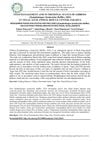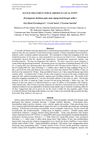 October 2024 in “Archives of Dermatological Research”
October 2024 in “Archives of Dermatological Research” Male and female pattern hair loss have different molecular pathways, suggesting unique treatment targets for each sex.
 July 2024 in “Science and Culture”
July 2024 in “Science and Culture” Thuja orientalis L. has many health benefits and could be used in new medicines.
 July 2024 in “Journal of Cosmetic Dermatology”
July 2024 in “Journal of Cosmetic Dermatology” Fractional laser therapy is a promising, effective, and minimally invasive treatment for hair loss.
 March 2024 in “Tropical Journal of Natural Product Research”
March 2024 in “Tropical Journal of Natural Product Research” Many people in Fez-Meknes use potentially toxic plants for various health and cosmetic purposes, but more research is needed to ensure their safety.
 December 2023 in “Frontiers in microbiology”
December 2023 in “Frontiers in microbiology” Mannan oligosaccharides improve raccoon dogs' fur quality and overall health.
 November 2023 in “Journal of Cosmetic Dermatology”
November 2023 in “Journal of Cosmetic Dermatology” Injecting a person's own fat into their scalp may help regrow hair and improve hair thickness in different types of hair loss.
 October 2023 in “Al-Kauniyah”
October 2023 in “Al-Kauniyah” Gibbons at Tegal Alur Animal Rescue Center need better feed management to improve their health and weight.
 August 2023 in “Tzu Chi Medical Journal”
August 2023 in “Tzu Chi Medical Journal” Iron deficiency is the main cause of hair loss in women, and iron supplements started within 6 months can improve hair health.
 July 2023 in “Jurnal Ilmu Kesehatan Hewan”
July 2023 in “Jurnal Ilmu Kesehatan Hewan” Sulfur-based treatments combined with simparica effectively treat scabies in puppies.
 July 2023 in “JAAD International”
July 2023 in “JAAD International” Two drugs, finasteride and minoxidil, are approved for hair loss treatment, but new therapies are being developed.
 June 2023 in “Research Square (Research Square)”
June 2023 in “Research Square (Research Square)” Sky Fruit Seed Crush can preserve goatskin with less environmental impact than traditional methods.
FGF9 helps hair follicles grow in small-tailed Han sheep by affecting cell growth and certain signaling pathways.
May 2023 in “Journal of Drugs in Dermatology” REVIVV® serum improves hair growth and reduces shedding in androgenetic alopecia.

Low vitamin D3 is not linked to different levels of thyroid hormones in people with autoimmune thyroid disease.
 January 2023 in “Journal of Ravishankar University”
January 2023 in “Journal of Ravishankar University” Hair loss can be caused by stress, aging, and harmful substances that create an imbalance in the body's natural processes.
 December 2021 in “International journal of minor fruits, medicinal and aromatic plants”
December 2021 in “International journal of minor fruits, medicinal and aromatic plants” The document concludes that in Sri Lanka, 25 common plants are traditionally used as home remedies for various health issues due to their medicinal properties.
 September 2021 in “Journal of the Egyptian Women's Dermatologic Society (Print)”
September 2021 in “Journal of the Egyptian Women's Dermatologic Society (Print)” The study concluded that low iron and vitamin D levels in women might play a role in chronic hair loss, despite no significant difference between those with and without hair loss.
 June 2021 in “Current Biochemistry”
June 2021 in “Current Biochemistry” Stingless bee propolis at a 6.25% concentration effectively stops dandruff-causing bacteria growth, performing better than ketoconazole.
 April 2020 in “Journal of evolution of medical and dental sciences”
April 2020 in “Journal of evolution of medical and dental sciences” A one-year-old child with a genetic condition had symptoms improved by treating zinc deficiency.
 January 2019 in “Journal of Dermatology and Venereology”
January 2019 in “Journal of Dermatology and Venereology” Sesame and pumpkin seed oil can effectively regrow hair in alopecia areata.

OCT can effectively screen and diagnose various medical conditions non-invasively.
 November 2016 in “Zoo biology”
November 2016 in “Zoo biology” Adding more vegetables and fruits improved capybaras' coat quality and health.
 August 2015 in “MOJ proteomics & bioinformatics”
August 2015 in “MOJ proteomics & bioinformatics” ePUKs could be valuable for regenerative medicine due to their wound healing abilities.
 January 2015 in “Endocrine updates”
January 2015 in “Endocrine updates” Bariatric surgery patients need careful before and after surgery care for safety and long-term health.
 September 2013 in “Molecular Biology”
September 2013 in “Molecular Biology” The document suggests that activating autophagy might help with regeneration by removing old and damaged cells.
December 2008 in “Al-Mağallaẗ al-ʻirāqiyyaẗ li-l-ṣaydalaẗ” Antioxidants improved hair growth in alopecia areata patients regardless of disease duration.
February 2021 in “International journal of regenerative medicine” A new method using fat tissue cells may help treat hair loss.
 247 citations,
August 2011 in “European Journal of Epidemiology”
247 citations,
August 2011 in “European Journal of Epidemiology” The Rotterdam Study updated its design and objectives in 2012, providing insights into various diseases in the elderly, including skin cancer, bone health, liver disease, neurological and psychiatric conditions, and respiratory issues.
 161 citations,
August 2013 in “Journal of experimental botany”
161 citations,
August 2013 in “Journal of experimental botany” Certain inhibitors slow down plant growth by causing early cell specialization without changing the cell development pattern.
 104 citations,
November 1978 in “JAMA”
104 citations,
November 1978 in “JAMA” The Protein-Sparing Modified Fast is effective for rapid weight loss and maintaining it, but requires medical supervision and can have side effects.


























